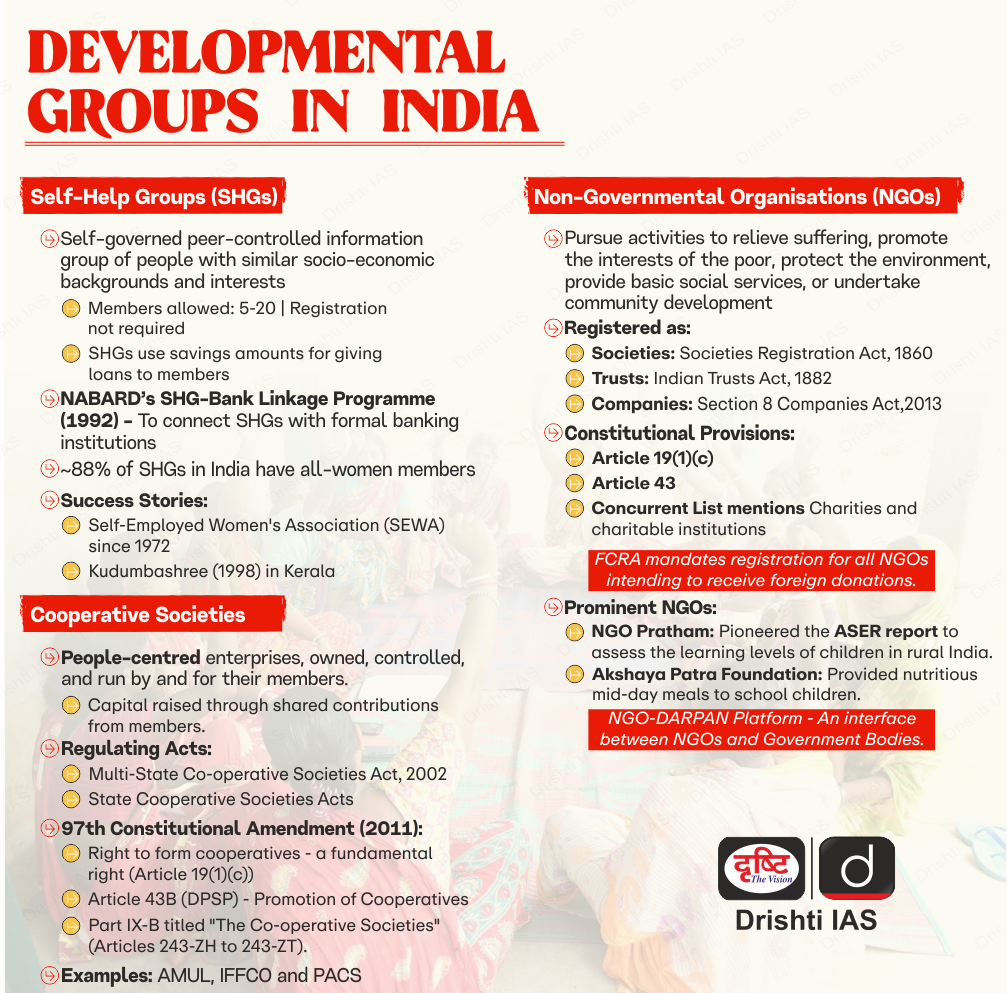Crackdown on NGOs under FCRA, 2010 | 09 Oct 2024
For Prelims: NGOs, Foreign Contribution Regulation Act, 2010 (FCRA), Oxfam India, Civil Society organisations (CSOs), United Nations Human Rights Council.
For Mains: Regulation of NGOs under FCRA and their implications on the developmental activities in India.
Why in News?
Recently, the government has cracked down on five major NGOs under the Foreign Contribution Regulation Act, 2010 (FCRA) due to concerns over their financial activities and objectives.
- These NGOs include Oxfam India, Centre for Policy Research (CPR), Environics Trust (ET), Legal Initiative for Forest and Environment (LIFE), and Care India Solution for Sustainable Development (CISSD).
- In the recent past, the International Commission of Jurists (ICJ) criticised India’s FCRA for being repressive and should be revised.
What are the Key Allegations Against NGOs?
| Issue | Details |
| Stalling Development Projects | LIFE is accused of being an instrument for US-based NGO EarthJustice to oppose coal mines and thermal power projects in India. |
| Protest Funding | ET and Survival International allegedly opposed the construction of a thermal power plant in Jharkhand, collaborating with the European Climate Foundation (ECF) to mobilise protests against coal industries in India. |
| Fund Mismanagement | CPR received foreign funds for its Namati-Environmental Justice Programme, which was reportedly used for litigation instead of specified research or educational activities. |
| Conspiring with Foreign Agents | Oxfam India is accused of conspiring to halt mining activities in Australia by Indian companies, allegedly supporting Oxfam Australia and working against Indian interests abroad. |
| Use of Other NGOs for Illegal Activities | After losing its FCRA licence, Oxfam sought “puppet NGOs” with valid permissions to redirect funds for illegal activities, such as providing funds to Josh and Aman Biradari Trust. |
| Political Agenda | NGOs are accused of promoting specific religious communities or castes rather than serving the public interest as a whole. |
| Financial Support | Oxfam India allegedly financially supported ET in anti-coal campaigns, particularly the protests in Dhinkia, Odisha. |
How FCRA Regulates NGOs Receiving Foreign Funding?
- Monitoring FCRA: The Union Ministry of Home Affairs (MHA) monitors the implementation of the FCRA.
- Through the FCRA, the ministry regulates foreign donations to ensure that such funds do not adversely affect the country’s internal security.
- Registration Requirement: Any association, group, or NGO intending to receive foreign donations must register under the FCRA. This registration allows NGOs to receive contributions for social, educational, religious, economic, and cultural programs.
- Five-Year Validity of Registration: Once an NGO registers under the FCRA, the registration is valid for five years. After this period, the NGO must apply for a renewal to continue receiving foreign contributions.
- 2010 Legislation and 2020 Amendments: The original FCRA Act, 1976 was repealed and replaced by new legislation in 2010 to modernise the law governing foreign contributions. In 2020, additional amendments were introduced to tighten the regulations and improve oversight of foreign donations.
- Purpose-bound Utilisation: Foreign funds must be used only for the purpose for which they were received, as stipulated under the Act.
- Transfer Restrictions: Registered NGOs are prohibited from transferring foreign funds to other NGOs.
- SBI Bank Account: Registered entities must open a dedicated bank account in the State Bank of India, Delhi, for receiving foreign funds.
- Annual Returns: NGOs are required to file annual returns, ensuring transparency in the use of foreign contributions.
- Prohibited Entities: The FCRA prohibits candidates for elections, journalists, media companies, judges, government servants, members of the legislature, political parties, and organisations of a political nature from receiving foreign contributions.
- Government’s Right to Cancel: The government can cancel an NGO’s registration if found violating FCRA provisions.
- Reasons for cancellation include false statements, inactivity for two years, violations of certificate terms, or acts against national interest.
What Reforms are Needed to Better Regulate NGOs?
- Clarity in Definitions: The government should clearly define terms like public interest and national security before restricting foreign funding to NGOs.
- It could reduce the risk of the law being misused against civil society organisations (CSOs) genuinely involved in welfare works.
- Independent Oversight: Establishing an independent regulatory body to oversee the foreign funding of NGOs will ensure transparent procedures in their functioning.
- Tiered Regulatory System: A tiered regulation approach could be adopted for stricter reporting for NGOs involved in national security while easing rules for those in humanitarian or development work.
- Aligning with International Standards: Revise the FCRA to align it with international treaties and human rights obligations, such as those outlined by the United Nations Human Rights Council.
- It will allow for a fair balance between national security concerns and the need for civil society to access international funding.
|
Drishti Mains Question: Discuss the allegations raised against NGOs under the FCRA and their implications for the developmental activities in India. |
UPSC Civil Services Examination, Previous Year Question:
Mains
Q. Can Civil Society and Non-Governmental Organisations present an alternative model of public service delivery to benefit the common citizen? Discuss the challenges of this alternative model.

